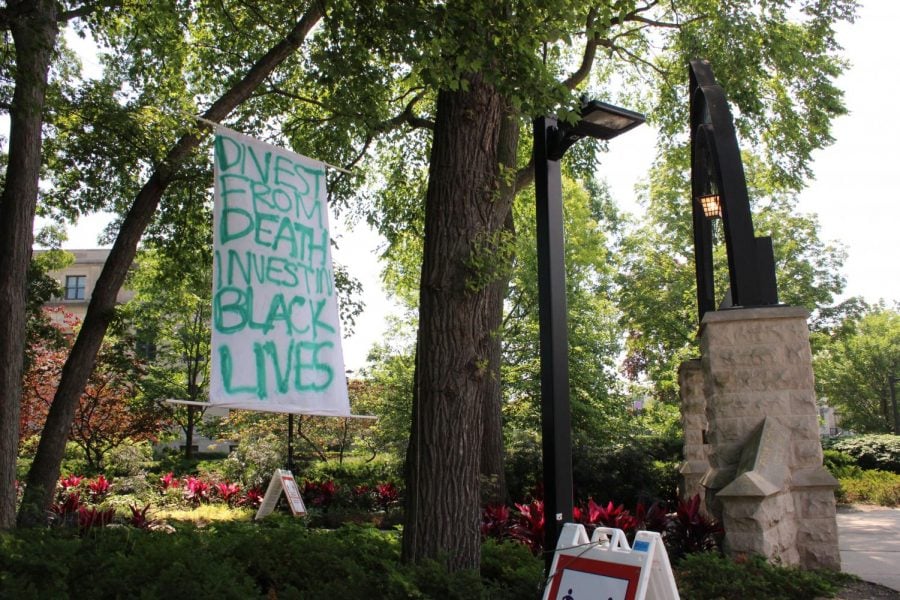Administrators commit to transparency and cultural change, but not to divesting from Northwestern police
Daily file photo by Gia Yetikyel
A sign hanging near the Arch on June 19. The sign was originally hung over the Arch, but was moved adjacent to it.
July 24, 2020
Northwestern administrators made commitments to be more transparent about staff diversity and creating a cultural change on campus, but wouldn’t commit to divesting from University Police, in a Friday Zoom meeting with students.
The meeting was centered around a June 3 petition from students, which lays out a number of demands, including allocating significant funds and resources to local activist groups that support the black community and to “disarm, defund and disband” UP. The administrators present were Interim Provost Kathleen Hagerty, Vice President for Student Affairs Julie Payne-Kirchmeier and Associate Provost for Undergraduate Education Miriam Sherin.
At the beginning of the meeting, Weinberg junior Sloane Harris asked if the University was committed to defunding UP. Hagerty responded no, but that the University is currently reevaluating the role of the police.
“I think we’re definitely committed to reevaluating the activities of the police on campus, but what exactly that means we have to find out,” Hagerty said. “(Senior Vice President for Business and Finance) Craig Johnson, who does supervise the police, has agreed to hire an outside expert to examine the activities of the police and look at what things they do that they need to do and what things they do they no longer need to do.”
Students then asked for information on the University’s relationship with the Chicago Police Department and the Evanston Police Department. Hagerty said the University has no official relationship with CPD. The University does have an official relationship with EPD, which serves mostly to keep EPD off of campus, and campus incidents are primarily within the jurisdiction of UP, Hagerty said.
Payne-Kirchmeier also provided some clarification on some questions students had about NU-SHIP coverage and protests, saying that NU-SHIP covers injuries, no matter how those injuries were sustained.
Weinberg sophomore Karina Karbo-Wright also brought up the safety and security of black faculty and staff on campus.
“While our petition is entitled for black students, we are also speaking about the black bodies on campus, which a lot of our dining staff and service workers are,” Karbo-Wright said. “This meeting is also to center their voices and look out for them. It’s really about all black bodies, not just students, not just black students who are paying tuition.”
The students asked about the health insurance provisions for the 230 dining workers who were laid off recently, and Payne-Kirchmeier said the deadline for that coverage currently goes until Sept. 20.
Karbo-Wright also asked about the policies for black faculty and staff returning to campus. Hagerty said the University has adopted a policy of maximum flexibility, but some positions require more of a physical presence than others.
Payne-Kirchmeier said these positions disproportionately affect staff of color.
Hagerty added that for those who are on-campus the goal is to keep people as safe as possible, from enforcing social distancing to requiring personal protective equipment. Ph.D. candidate Sarah Peko-Spicer said if black staff will be cleaning the spaces used by students, they should be paid more, and Payne-Kirchmeier said the University is also trying to figure out how people can clean up after themselves.
The conversation then turned to discuss how to make black students feel welcome and safe on campus, and how to increase campus diversity.
Hagerty said the University hasn’t done enough, but that NU is hiring more diverse academic leadership that will hopefully help recruit more diverse faculty. Harris said most of the recent leadership changes have happened in the humanities, with Charles Whitaker and E. Patrick Johnson hired as the deans of the Medill School of Journalism, Media, Integrated Marketing Communications and the School of Communication. Harris said the focus should turn more toward STEM programs, where Hagerty agreed not as much progress had been made.
Peko-Spicer said recruitment efforts should be coupled with retention efforts to make people want to stay on campus, which she said include divesting from law enforcement.
Sherin outlined some steps the University is taking to affect a culture change to make the campus more inviting, including starting a set of work on inclusive pedagogy for faculty in the fall. She said the workshop is just a jumping off point for an ongoing process, and Payne-Kirchmeier added that they’re working on creating practices that don’t rely on single administrators and that go beyond one single department or program.
Administrators also committed to providing a central location for people to access this information, and to be more transparent and more forward in disclosing University plans and discussions.
But students emphasized the urgency of the situation.
“To us as students, we see reactionary emails come through when some large event happens and then everything from the past 50 years gets back brought into the light like it was solved, but it actually never was,” said McCormick senior Lawan Alade-Fa. “This lack of urgency only reads as a sense of lack of caring. When you put this in the context of a university of such prominence and the positionality it holds as not just as a space at the Northwestern community but as a society. Swift action when something occurs – when you have students getting brutalized – needs to happen as quickly as possible.”
Email: [email protected]
Twitter: @emmaeedmund
Related Stories:
— Students urge Northwestern to address issues of police divestment


